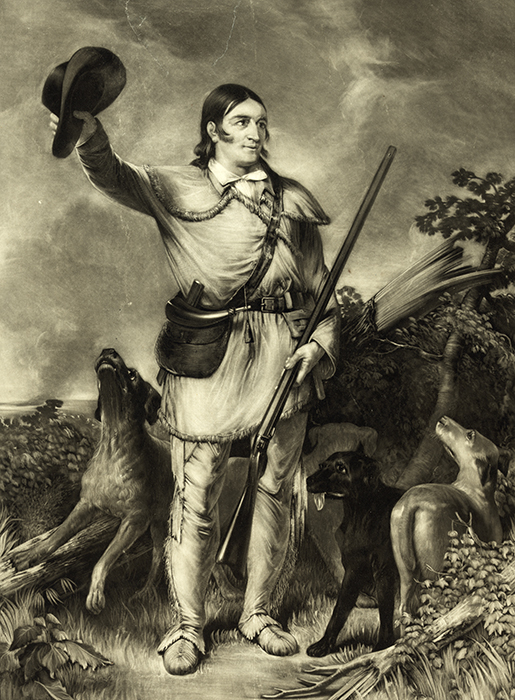Crockett, Davy (1786-1836), was one of the most famous frontiersmen in United States history. He became known as a hunter and Indian fighter and used his reputation to build a political career. Crockett succeeded Daniel Boone as the nation’s best-known symbol of the American frontier. Many people felt the national spirit of the United States was reflected in Crockett’s motto: “Be always sure you’re right—then go ahead!” Crockett died fighting in the war for Texas independence. His life and death became a part of both history and legend.

Early life.
David Crockett was born in Greene County, Tennessee, on Aug. 17, 1786. The Crockett family moved to Jefferson County, where Davy’s father opened a tavern in 1796. Davy started school at about the age of 13. He often played hooky, and he ran away from home for about 21/2 years to avoid being punished for missing class. In 1806, Crockett married Mary (Polly) Finley, the daughter of a farmer. They had three children.
In 1813, Crockett became a U.S. Army scout. He fought in the Creek Indian War in what is now part of Alabama and Florida until 1815. His wife died that year. In 1816, Crockett married Elizabeth Patton, a widow with two children. They moved to western Tennessee in 1817.
Political career.
In Tennessee, Crockett developed a successful political career. He held several local positions, including justice of the peace, town commissioner, and colonel of the county militia. Crockett served in the Tennessee legislature from 1821 to 1824. He won a seat in the United States House of Representatives from Tennessee in 1827 and was reelected in 1829 and 1833.
In Congress, Crockett opposed President Andrew Jackson and other Tennessee members of Congress on several issues, including land reform and a bill to relocate Indian tribes. Whig Party leaders promoted Crockett as a presidential candidate for the election of 1836. But Crockett lost his reelection bid for Congress in 1835, and his presidential ambitions ended.
The Alamo.
In November 1835, Crockett set out for Texas. He felt he could renew his political career there and become wealthy as a land agent. At the time, Texas was fighting to gain its independence from Mexico. In early February 1836, Crockett joined 188 men who had established a fort at the Alamo, an old Roman Catholic mission in San Antonio. When Mexican troops attacked the fort, the men held them off for nearly two weeks. But on March 6, the Mexican forces overran the Alamo. Some historians believe that a few men, perhaps including Crockett, survived the battle but were then executed by the Mexicans. Other scholars believe that all the defenders died in the battle.
The legends.
Crockett excelled at backwoods brag, a type of country exaggeration, and he told many tall tales about himself. In one tale, a raccoon gives up when Crockett spots him while hunting. Crockett also may have been exaggerating when he claimed to have killed 105 bears in seven months.
Crockett became known for political antics as well. For example, he once memorized an opponent’s standard speech and spoke it word for word as his own at a debate. Not being able to repeat the same speech, his confused rival was forced to make an unprepared reply.
Stories written after his death helped create the fictional legends of Davy Crockett. One description claimed that he could “run faster, jump higher, squat lower, dive deeper, stay under longer, and come out drier than any man in the whole country.” Through the years, Crockett has been the subject of songs, books, TV programs, and movies.
See also Alamo ; Pioneer life in America (Places to visit) .
